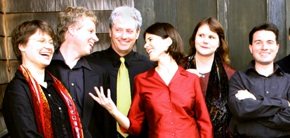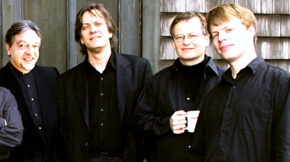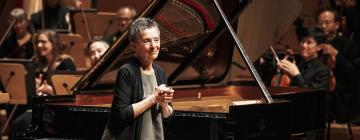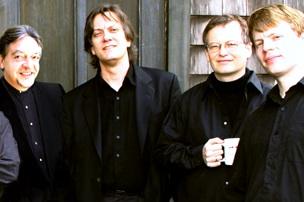“With the possible exception of the ‘1812 Overture,’ I can’t think of any piece of music as tied to a specific year as Claudio Monteverdi’s 1610 Vespers,” said Warren Stewart, artistic director of Magnificat, the vocal and instrumental ensemble that specializes in the early Baroque. “It captures the zeitgeist of that year. The Earth going from the center of the universe to being a speck in infinite space changed everything, including the way people heard music. Music became more concerned with human emotions, with trying to depict them. And the Vespers does that by fusing old and new, injecting ancient psalm tones of a kind of ur-music that predates Christianity into a modern environment, becoming something timeless — the past, interacting with the present, becoming the future.”
Magnificat will be performing Claudio Monteverdi’s Vespro della Beata Vergine for the quadricentennial anniversary of its publication at concerts on April 23-25 given at St. Patrick’s Seminary in Palo Alto, St. Mark’s Episcopal Church in Berkeley, and Grace Cathedral in San Francisco, each featuring a lecture by Stewart, 45 minutes before the performance.

“The acoustics of every space is part of the performance,” Stewart commented. “[It’s] like another instrument, another voice onstage. These are three exceptional spaces that will enhance the sonic experience. We’ll be presenting a well-loved, well-known masterpiece that’s been recorded many times. We’ve done it before, in 1994 and ’99, then held off till the 400th anniversary. Many of the performers have performed it multiple times; there’ll be people in our audience who’ve sung it! That sort of thing doesn’t happen very often for us. So we try to be in the audience’s frame of mind, then make decisions how to perform it, how to make it speak to the audience today. It’s like staging a play, with an element of make-believe, an act of imagination the audience and performers do together. Any music — any art — is ineffable. And, like the visual art of that period, you’ve got to make the hand in the picture a little bit out of proportion to show what you want to show. The art of Mannerism and the early Baroque: That historical transition from the High Renaissance is exactly when the music we’re interested in comes from.”

Stewart also spoke of the constantly changing detail of the music. “These settings of the Office [of Vespers] are extremely elaborate, like the facade of Notre Dame Cathedral, packed dense with stuff. It employs a remarkably wide sonic palette, the full range; and the attention to meaning — the words themselves, the argument of the text — are great art. The words at one point are: ‘Out of the dunghill He has lifted the needy and placed them among princes of his people.’ Each phrase is set to different dynamics: quiet, fast, grand — so characteristic of this music. It contrasts with other, maybe older, masterpieces that are a single, solid-state depiction of beauty.”
Magnificat’s first concerts took place in 1992-1993. “We played a few small things before we knew we wanted to focus on the music of the 17th century,” recalled Stewart. “It’s a fascinating period in general cultural history, one of experimentation. Opera was invented; there was the emergence of the virtuoso singer. ... Musicians died in plagues; traditions were lost.”
Listen to the Music
Performed by Magnificat (live recording)
Of the group’s projects, Stewart said: “Our attitude from the start has been ‘Let’s get to know the music and share it.’ Much of it nobody was playing, because there were no modern editions. Often, a performance of ours will be one of the very few of a particular piece. We make our own editions.”
He spoke, too, of Magnificat’s Cozzolani Project, recording in stages the complete works of composer Chiara Margarita Cozzolani, since 2000. “She was a Benedictine nun from a convent near the Duomo in Milano. There was quite a bit of music composed by nuns, circulated between convents in manuscript, but not published. That hers was, was exceptional. We’re committed to performing music by women. And this project is a great deal of what we’ve been up to for the past 10 years.”
The firstborn of the Project, a double CD, will be released at the Berkeley Music Festival in June, with much of what else has been recorded becoming available as downloads. Information is available here. A sample is available through the SFCV Web site.
A CD release party will be held on June 7 at Yoshi’s San Francisco (tickets here) . Crowed Stewart, “We’re the first early-music group to play there!”
Magnificat will be joined for the Vespers concerts by an exceptional Italian tenor Mirko Guadagnini, who will be making his S.F. debut.

